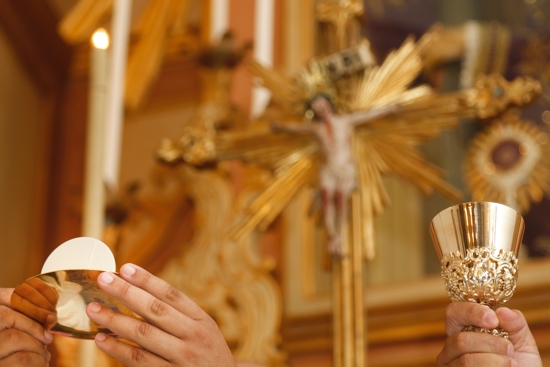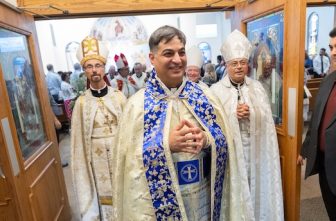
If you were asked to summarize the entirety of the Gospel into one sentence, how would you do it? I suspect that for some the answer might be “God loves you.” It’s a great answer, and I really can’t argue with it. At the heart of everything within Scripture lies the astounding claim that every single one of us has been intentionally woven together by a God who knows us by name and who has done that weaving so that we might be with him forever in heaven. “God loves you” summarizes this claim succinctly and accurately. It’s a perfectly good bumper sticker for a believer. (Though I would quibble that it’s rather less obvious than it may seem at times to us cradle Catholics.)
The Mass is a celebration and manifestation of that divine love, a foretaste of the life of heaven to which we are all invited, the communion of all things in the heart of the Father through Christ, with Christ and in Christ, in the unity of the Holy Spirit. But it is not a general idea of this love that we celebrate Sunday after Sunday. Rather, we remember a specific moment in time in which this love entered most deeply into the life of the world in all its darkness and fragility. You see, the Mass is an unbloody re-presentation of Calvary, or at least that’s the definitive claim of the Catholic Church. It is the same sacrifice made 2,000 years ago on Golgotha but made present to us through sacramental signs. And that sacrifice has saved the world, and still does, as it reverberates through time upon all the altars of the Catholic world.
But isn’t this understanding of the Mass as an unbloody sacrifice rather outdated? Maybe we need to reconsider all this talk of Calvary, and focus instead upon the Resurrection, and Pentecost, and all the great stuff that came after that dreadful day we call (ironically?) “Good Friday.” Do we really need to “proclaim your death O Lord, until you come again”?
To be sure, the mystery of the Mass is indeed the “Paschal Mystery,” which encompasses everything that touches upon the entire mystery of Jesus Christ. But at its heart, it seems to me, is his saving death, a sacrament of his complete commitment to the Father and to his will, which is of course the salvation of men and women. But why is this so necessary? Surely God does not demand blood sacrifice? How could a bloody, shameful death be pleasing to God and effect our friendship with the Eternal?
To understand this, it seems to me necessary to understand that we live in a fallen world. And because of that fall, to love demands a willingness to die. If we are not willing to suffer for the other, not just be inconvenienced, but to suffer, we only love so much. And this willingness to suffer, even unto death, flows from the decision made with love to place the other before oneself. “You matter to me, even so much that I will lay down my life for you.” I think we all want someone to love us like that, to see in us someone good enough to be put first. And God proclaims this on Calvary — I love you, unto death. Certainly, this is cause for a hearty alleluia and a great amen!
But there is more. This way of loving, of putting the other first, is also the way in which we are called upon to love one another. Here the cross becomes much less sentimental, I’d say. Because the crucifix, and so much more the Mass, invites us to love others when they reject us, when they misunderstand us, when they hurt us, and even when they put to death those things within us that give us life. None of this demands that the Christian become a door mat or endure abuse or offenses against our dignity. But it does demand that we abandon vengeance and that we pray for those who hurt us and ignore us. Like Jesus did.
The Mass is the source and summit of our faith. And it is the source and summit of the moral life, because it is Calvary, the place where love bleeds for the beloved.
I think it’s quite significant that one of the consequences of our parents’ first “No!” to God, recorded right there in Genesis, is birthing pains. To give birth in our fallen world is painful, or at least so I have been told. But I think there’s more to this part of the dark story of our fall than a mythologizing of a biological phenomenon. Its deeper meaning is found in the truth that now love will cost us, and at times, that price will be very high indeed. But it is the only way to love as Christ loves, and to find the true meaning of our lives.
God sent his only son, who knew no sin, to die for us so that we might live. And now we must do the same for others. Another way of putting this? God loves you.
Father Erickson is parochial vicar of Nativity of Our Lord in St. Paul and interim chairman of the Archdiocesan Liturgical Commission.




